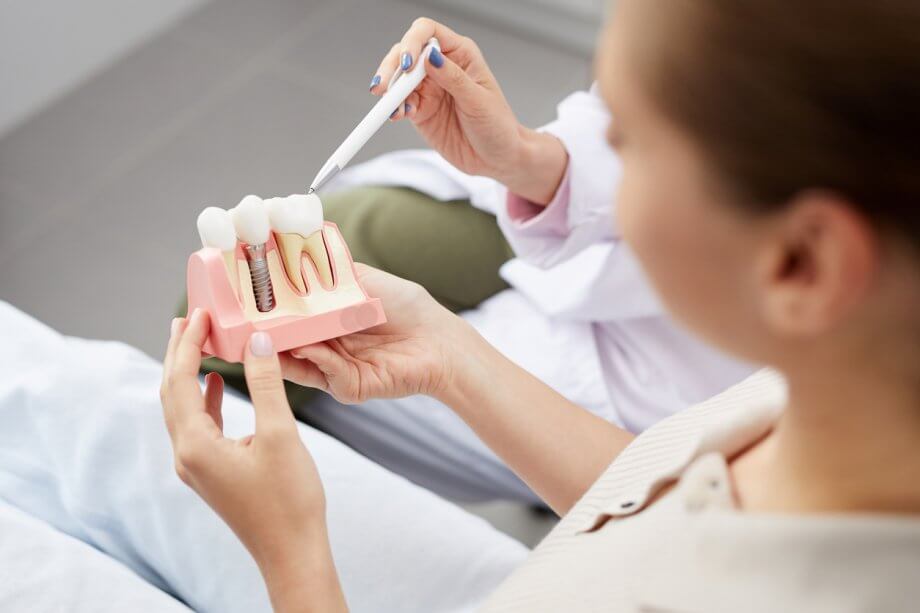Once you’ve made the decision to pursue dental implants as a solution for your missing teeth, the next step is finding the right doctor for the job. At Smiles on the Upper Westside, Dr. Massiah and his team are highly trained and have the experience needed to help you achieve the beautiful smile you’ve always wanted.
If you’re interviewing a few different providers for your dental implant procedure, make sure whomever you choose can answer the questions listed below.
Am I a candidate for dental implants?
You want to find a doctor who is upfront with you about any potential challenges you might face and what you can expect from the procedure. There are many reasons why dental implants may not be an option for you. Patients with uncontrolled diabetes, women who are pregnant, and anyone who has serious unmanaged health conditions should not have dental implant surgery.
Patients with gum disease, too, need to have their periodontitis treated and under control before getting implants placed. This is because unchecked gum disease can cause bone in the jaw to degrade, and this bone is critical for supporting dental implants. Without sufficient bone support, implants may become loose over time.
If you’ve suffered bone loss in the jaw already, either due to periodontitis, tooth loss, or osteoporosis, you’re also not a candidate for traditional dental implants. You may be able to get mini dental implants (MDIs) instead, which are smaller in diameter than traditional titanium dental implants and therefore require less bone support. Alternatively, you can undergo a bone grafting procedure prior to implant surgery. During this procedure, we make an incision in your gums and place grafting material where we want the bone to form. Your own bone will grow around the bone grafts, creating a stable base for your dental implants to be placed. This process typically takes a few months to complete, although every patient is different.
While you might be eager to undergo dental implant surgery as soon as possible, it’s important to find a doctor who will not compromise or rush through these essential first steps in the process. If you are not a good candidate for implants but your doctor performs the procedure anyway, there is a significant risk of dental implant failure.
What type of dental implant restoration is right for me?
“Dental implants” is used as a catch-all term, but there are many different options when it comes to dental implant restorations. Any doctor you’re considering should be able to help you determine which one is the best choice for you—and explain why they feel this way. The most common dental implant options include:
Single-Tooth Dental Implants – This is the type of restoration most people think of when they think about dental implants. These involve a titanium post that is implanted directly into the jaw bone. An abutment is attached to the implant post, which is used to anchor a crown to complete the restoration.
Implant-Supported Bridges – An implant-supported bridge is used when three or more adjacent teeth need to be replaced. Rather than using an individual implant for each missing tooth, only the two outermost teeth receive implants, which are used as supports for a dental bridge. This solution is more stable than a traditional bridge with crowns as abutments.
Implant-Supported Dentures – Both partial and full dentures can be affixed to dental implants. This provides a more functional restoration than traditional dentures, which must be affixed using adhesive pastes, and can pinch, slip, and cause sores in the mouth.
Full Arch with Only Four Implants – If all of the teeth on a single arch need to be replaced, this restoration can be used to replace them—and it can be placed the same day your teeth are extracted. This type of dental implant procedure may also be an option for some patients who have experienced bone loss, particularly if the bone loss is primarily located in the back of the jaw.
Mini Dental Implants – If there is insufficient room or bone density to support traditional implants, mini dental implants may be a good alternative. They are smaller than traditional implants, allowing them to fit into tight spaces and requiring less support from the jaw.
What are the advantages of dental implants in my situation?
Every dental professional has the talking points about dental implants down pat. What you want to know is why dental implants are right for you and your unique circumstances. A qualified doctor should be able to go beyond the well-known benefits of dental implants and tell you why you make a good candidate for the procedure and how dental implants will improve your life and your oral health.
How much experience do you have with dental implants?
These days, it seems like just about everyone in the dental profession is offering implants. How do you know a doctor really knows what they’re doing?
At Smiles on the Upper West Side, we take a team-based approach to dental implants, collaborating across several specialties in order to provide you with superior results—and eliminating the need to visit multiple dental practices. Dr. Massiah’s knowledge of dental implants has led to him being invited for speaking engagements on the topic. Dr. Smolen is a member of the International Team for Implantology and is the Educational Director of Full Mouth Rehabilitation at NYU’s College of Dentistry. Dr. Narain is a board-certified periodontist, giving him the knowledge to help patients resolve bone and gum issues prior to implant surgery.
What materials and technology do you use for dental implants?
If a practice is offering implants at a price that seems too good to be true, it probably is. Using cutting edge materials and technology may cost more, but the results are worth it. Cheap restorations can look fake and cookie-cutter, while high quality custom-made crowns, dentures, and bridges like the ones used at Smiles on the Upper West Side look completely natural and realistic.
Look for a practice that uses guided implant placement technology during the implant procedure. This allows doctors to create a customized implant placement map prior to your surgery, which shows the precise location for each implant. It also lets you get an accurate preview of your smile before your implants are placed. With this technology, we can produce optimal results for all of our patients.
Other important technologies to look for include cone beam scanner 3D imaging, digital x-rays and intraoral cameras, and electronic medical records to ensure that your documentation and records are never lost or misplaced. Because you’ll be spending some time at the dentist’s office to get your implants, you may also want to find a practice that feels comfortable and that offers amenities like wi-fi and digital flat screen monitors.
Do you have before and after photos?
Practices with extensive experience placing dental implants will be happy to provide you with patient testimonials, references, and before and after photos. Ask for them. Our practice has an online gallery showcasing our doctors’ results; when you come in for a consultation, we can show you before and after photos for patients who have cases similar to yours so you can get an idea of what kind of results you should expect.
If a doctor you’re talking to will not provide references or testimonials and has no before and after photos to show you, it’s a good idea to move on to the next dental practice on your list.
Can you provide me with a cost estimate?
Any practice you’re considering for dental implants should be completely transparent about the costs involved and provide you with an estimate in writing. At Smiles on the Upper West Side, our billing staff will check with your dental insurance provider to see if they will cover all or some of the costs of your implants. In some cases, they may not pay for the implants themselves, but may cover the cost of crowns. Other times, part of the implant procedure will be covered if the implants are needed after facial trauma or if bone loss has already occurred.
Once we know what to expect from your dental insurance provider, we will give you a written estimate of what you will be responsible for paying. We are also pleased to offer our patients CareCredit financing to help them pay for their dental implants.
When it comes to dental implants, don’t seek out a “good deal”—the best deal is a high-quality restoration that makes you feel confident in your smile and stands the test of time.
Learn More About Dental Implants
Dr. Massiah and the team at Smiles on the Upper West Side look forward to meeting with you to answer any questions you might have about getting dental implants. To schedule an appointment for a consultation, contact us at 212-222-5225 today.

